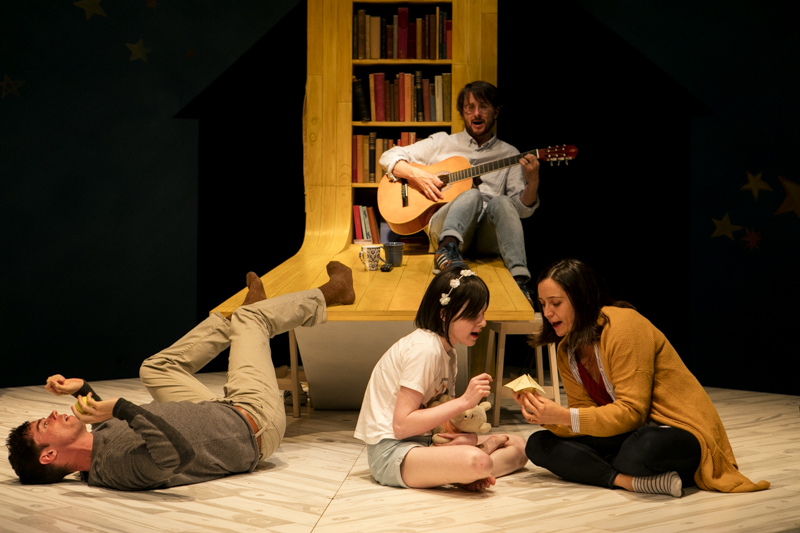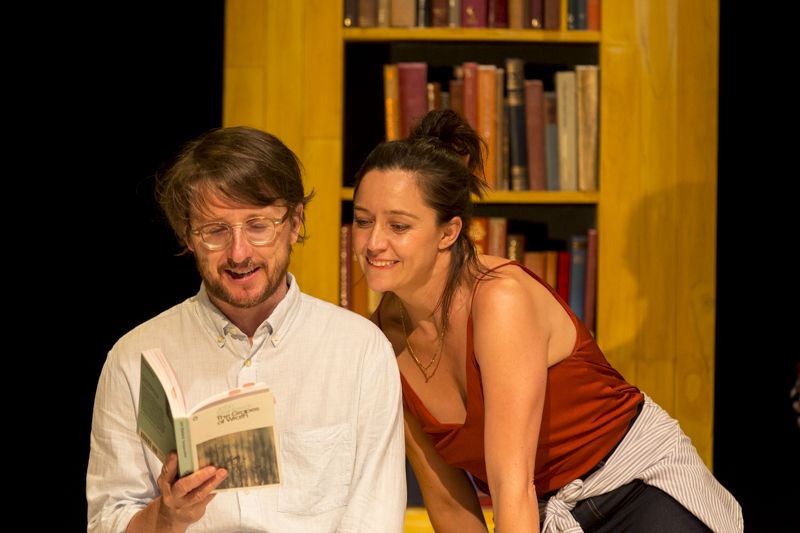Peter Goldsworthy’s novella, Jesus Wants Me for a Sunbeam, a meditation on love and grief, was first published in 1993. It’s been given a smart stage adaptation by writer and actor Steve Rodgers, whose version premiered at the National Theatre of Parramatta last year in a production by Darren Yap. That production is now playing at Belvoir, and it’s not difficult to see why its initial run was received so warmly.

Belvoir’s Jesus Wants Me for a Sunbeam. Photo © Brett Boardman
Jesus Wants Me for a Sunbeam is a window into the life of the Pollards, a tight-knit family easy to love. There’s dad Richard (Matthew Whittet), mum Linda (Emma Jackson), and their 12-year-old son Ben (Liam Nunan) and 10-year-old daughter Emma (Grace Truman). If total domestic bliss seems to just elude them, it’s the result of nothing more serious than mum and dad’s quiet but persistent striving for it.
With a commendable level of economy, we’re shown how they’ve gradually become an almost hermetically sealed foursome, with a seeming absence of much extended family or friends. They even do away with their television in an understandable attempt to avoid the horrors of the outside world. But reality, harsh and unavoidable, intrudes on their mostly idyllic lives, full of singalongs and bedtime stories, when Emma becomes incurably ill. How the family decides to deal with the tragedy powers the play’s exploration of love, injustice, and how it is we cope with mortality in the absence of certainties.
The tone of the piece has been carefully calibrated by Rodgers, who balances the play’s sober subject matter with affectionate observations of the Pollards’ daily lives. Though they may now be irrevocably shaped by Emma’s circumstances, fundamental things about their dynamic remain the same, necessarily encompassing the full range of human emotion. They may be marked by sorrow, but that doesn’t preclude moments of joy or indeed ill-humour, even as they feel they’re meant to be putting aside pettinesses to rally around Emma.
Jesus Wants Me for a Sunbeam mostly avoids feeling saccharine or sentimental, both easy traps for a play of this nature to fall into, and Rodgers preserves the poeticism of Goldsworthy’s prose in dialogue which never feels mannered or overdetermined. For instance, there’s something almost lovely in the undramatic way Linda says she and Richard have “walked away” from religion in the face of Emma’s illness.

Jesus Wants Me for A Sunbeam. Photo © Bret Boardman
If there’s something hindering the play from fully taking off, it’s that it doesn’t devote quite enough attention to why the family decide to do what they do in response to their sad circumstances. Without wanting to spoil too much, what’s proposed and acted upon is radical and has grave moral implications, and the audience deserve to see the family consider these things in more detail than is presented here.
As such, the story sort of motors along, which is certainly moving given the subject, but ultimately feels unmoored from reality in a way. This feeling is heightened by the fact that the action is told through Ben’s perspective and in flashback – the benefit of time and its ensuing perspective doesn’t register all that strongly.
The strength of the cast is such that for many audiences, these things won’t matter much in the grand scheme of things. Truman is ideal as Emma. Called ‘Wol’ in acknowledgement of her owl-like wisdom, she exudes the kind of precocious intelligence and old soul personality worthy of the nickname. Though she does get one moment in which she powerfully expresses Wol’s fear of death, you wish the play had shown the character grapple more with her circumstances.
As parents thrust into the worst circumstances imaginable, Whittet and Jackson are hugely affecting. The play is as much about their love for each other as it is about how they deal with their daughter’s fate, and you believe that these two have a shared history, full of inside jokes and peculiarities, that spans many years.
Nunan is convincing as older brother Ben, and deftly demonstrates the ways in which young people struggle to reconcile themselves to life-changing events when their personalities feel so nascent and in flux, even though the play leaves him scant opportunity to do so. Like the others, his performance feels grounded in emotional specificity. Rounding out the cast, Valerie Bader and Mark Lee are warm and effective as grandparents, as well as a no-nonsense oncologist and family priest. Both make the most of their time onstage.
Most of the original cast (bar Whittet, who is new to the production) has returned, and their experience with the material shows in the fluidity of their performances. These play out against Emma Vine’s enveloping set, with a beautifully painted backdrop, which is dominated by a towering bookcase that in many ways forms the spine of the family.
Stories are how Richard and Linea sealed their love; how the children were taught right and wrong and how to be a person in the world; and how Wol got her name, derived from the dyslexic Owl of the Winnie the Pooh stories. Story, Rodgers posits, is also how we make sense of things as big and momentous as love and loss.
Jesus Wants Me for a Sunbeam is at Belvoir until March 8.











Comments
Log in to join the conversation.